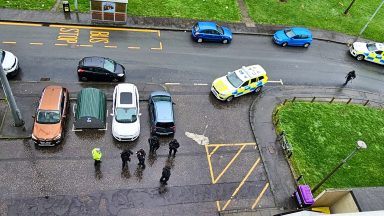Police Scotland officers say they are branded “trouble makers” and “red marked” in their career if they raise complaints about sexism and misogyny, a report has found.
Staff within the force say they feel they have a “target on their back” after bringing complaints or issues to light.
Of those surveyed as part of the report, compiled for the Scottish Police Authority people’s committee, 81% agreed that sexism and misogyny is an issue within the force.
However, only around 50% say the organisation is doing enough to tackle it.
Fears of a “boys’ club culture”, as well as bullying and intimidation, have been expressed within the report.
The findings, published on Wednesday, come just days after chief constable Sir Iain Livingstone admitted that “institutional racism, sexism, misogyny and discrimination is a reality for Police Scotland”.
Within the report, published on Wednesday, those who raised grievances said they experienced “victim blaming” and feelings of isolation.
The report adds: “Colleagues shared that experiencing these, or witnessing it happen to others, discourages them from raising issue, and therefore challenging behaviour, again in the future, as they do not see it to be worth the negative impact.”
Approximately 86% of female staff on the force have either been subjected to or witnessed sexism and misogyny.
More than 40% of male colleagues said they have witnessed sexism and misogyny.
The research, carried out between August and October last year, has been described as a “crucial first step” in addressing the problems.
The report features a number of examples of negative experiences from staff, including instances of being disregarded in meetings and insubordination.
Respondents told how they were subjected to bullying and intimidation as a result of reporting concerns, including inappropriate behaviour and being labelled a “grass”.
The 32-page report noted how “the real team meetings take place on the golf course” as an example of the “boys’ club culture” in the force.
Working arrangements including lack of support for flexible working plans, maternity and paternity leave were also highlighted.
Comments included feelings that women are “set up to fail” by the lack of life and work balance which “ignores an entire cadre of officers with valuable skill sets”.
The report states: “Often colleagues disguise or label sexist behaviour as ‘banter’ and if someone challenges this or calls it out, they are labelled as not being able to take a joke and isolated from the team.”
Other respondent said they felt discouraged or overlooked for promotion and the force lacked proper support for staff.
The report stated: “The overall consensus is that support within the organisation is limited and negative consequences are common for those who make these complaints”.
It details work by the Sex Equality and Tackling Misogyny Working Group, formed in 2021, and also states: “Public perceptions of policing could be impacted by some of the information that is shared in the public domain, which could in turn impact on trust and confidence in policing.”
Commenting on the new report, assistant chief constable Emma Bond, lead on the delivery of action to tackle sexism and misogyny, said: “This was a crucial first step in understanding the extent of sexism and misogyny within our organisation.
“As the Chief Constable made clear, we know from independent reviews, court and conduct cases and from listening to our own officers and staff that people don’t always get the service or experience from Police Scotland that they need and deserve. The onus is on us to enable people to make to their voices heard and take action to address their concerns.
“Hearing these experiences has been difficult and, in some instances, shocking but absolutely necessary.”
Female officers have previously spoken out about their experiences.
Last year, former fire arms response officer Rhona Malone won almost £1m in compensation from the force after an employment tribunal ruled she was victimised while raising sexism concerns.
Chief constable Bond added: “Women told us about everyday sexism: the banter, the boys’ clubs, being overlooked for promotion, treated dismissively, regardless of experience, grade or rank, because you are a woman, of being told having children meant your career was over.
“Men also told us of witnessing sexism and misogyny, feeling disempowered and unable to step in but also about their own experiences of sexism.
“However, people also told us they were seeing progress and change. Women leading at every level in policing, proactive steps to recruit more women and better support for flexible working.
“We are committed to building on this, to continue to listen, to change and become an inclusive, anti-discriminatory organisation that reflects, and influences, the communities we serve.”
Follow STV News on WhatsApp
Scan the QR code on your mobile device for all the latest news from around the country





























